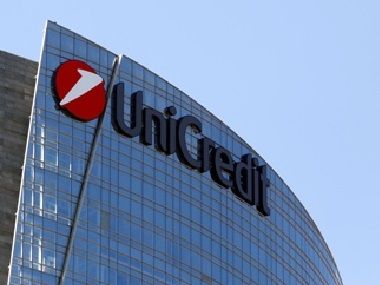UniCredit said it plans to raise €13bn through a rights issue to fill a gaping capital hole after taking a €12.2bn charge to cover the cost of increased loan loss provisions and restructuring charges.
The rights issue will be fully underwritten by 10 banks led by structuring advisers Morgan Stanley and UBS, plus joint global coordinators Bank of America Merrill Lynch, JP Morgan and Mediobanca, and co-global coordinators Citigroup, Credit Suisse, Deutsche Bank, Goldman Sachs and HSBC.
All will act as joint bookrunners. UniCredit’s corporate and investment bank will also be a structuring adviser.
The rights issue will be one of the biggest ever by a European bank, and will need to be approved by shareholders on January 12. It is expected to launch in the first quarter.
Chief executive Jean Pierre Mustier, who took over in July, said there were no loopholes for underwriters to pull away and he said the bank’s plans had not been affected by last week’s resignation of Italy’s prime minister after defeat in a referendum over constitutional reform.
“Our plan has not changed from the Saturday before the referendum to the Monday after,” Mustier said at a press conference in London.
“Italy is a country that has seen 63 different governments since 1945, it is a country that is used to dynamic political interaction.”
He added: “We have very strong underwriting agreements, maybe an atomic bomb on London might change it.”
There will not be any placement of shares with anchor investors as part of the rights issue, he said.
The bank’s biggest shareholders include Capital World Investors (6.7% stake), Abu Dhabi investor IPIC (6.5%) and Libya’s government (2.9%), according to Thomson Reuters data.
As with other Italian banks, foundations also hold significant stakes. The two largest in UniCredit are the foundations of Verona, Vicenza, Belluno and Ancona (3.5%) and Torino (2.5%).
UniCredit shares, which will also be consolidated on a 1-for-10 basis alongside the rights issue, rallied 8% on Tuesday, but are still down 49% this year.
“These actions are consistent with our expectations, and we think they represent a good trade-off between profitability and capital strengthening,” said Paola Sabbione, analyst at Deutsche Bank.
BAD LOANS
UniCredit has sold assets in recent months to bolster its capital, and Mustier said no more asset sales were planned.
Last week it raised €2.5bn from the sale of a 32.8% stake in Polish bank Pekao and on Monday agreed the sale of Pioneer Investments to Amundi for €3.5bn.
Mustier said his strategy was based on strengthening capital, cutting costs and reducing risks in its €77bn pile of impaired loans.
The bank will move €17.7bn of non-performing loans into two securitisation vehicles set up by third party fund managers Fortress and Pimco. UniCredit will retain a minority interest in both entities under the deal, called Project Fino.
The bank will take a €8.1bn provision to reduce its non-performing loan book, the bulk of the €12.2bn fourth-quarter charge.
Mustier’s plan aims to build UniCredit’s return on equity from 4% currently to over 9% in 2019. No dividends will be paid this year but he aims to pay out between 20% and 50% of earnings in future years.
Mustier announced 6,500 more job cuts, meaning it will axe 14,000 jobs by the end of 2019, or 14% of staff.
He aims to save €1.7bn in annual costs and will close 944 branches, or a quarter of its network across Europe.
The corporate and investment bank will be largely unaffected and will work more closely with the commercial bank, particularly using its strength in transaction banking. CIB is also strong in syndicated loans, sponsor-driven acquisition finance, covered bonds and trade finance.
Group revenues are only expected to grow by 0.6% annually in the next three years.
“We have developed a plan that is pragmatic, tangible and with achievable targets,” Mustier said. “It is dependent on cost and risk management, levers which are firmly under our own control.”
He is targeting a common equity Tier 1 ratio of over 12.5% on a fully loaded basis in 2019, up from 10.8% at the end of September.
In contrast to many bank restructurings, UniCredit expects its risk-weighted assets to rise to €404bn by 2019, up from €361bn at the end of 2015. It said that is to limit the impact of negative interest rates, which is eroding its net interest income.
Mustier said he will also create a leaner corporate centre, which will reduce costs and improve transparency and accountability in the unit. The corporate centre’s share of group costs are forecast to fall to 2.9% from 5.1% now, and the centre’s annual loss should fall to €300m from about €1.3bn now.
